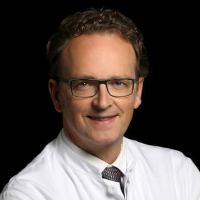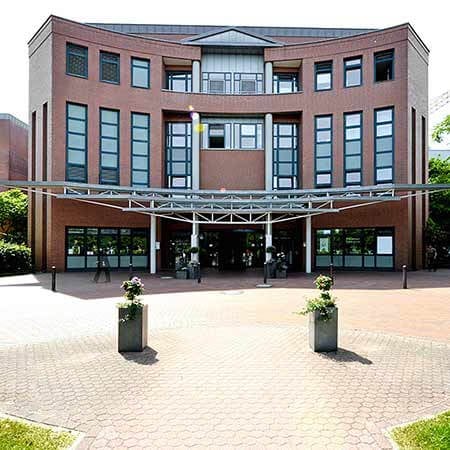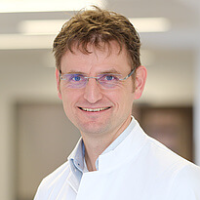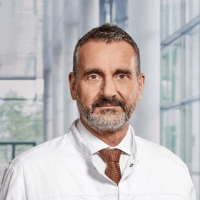Aortic Valve Insufficiency (AVI) — Aortic Valve Repair: treatment in the Best Hospitals in the World
Treatment prices are regulated by national law of the corresponding countries, but can also include additional hospital coefficients. In order to receive the individual cost calculation, please send us the request and medical records.

Department of Cardiothoracic Surgery
According to the Focus magazine, the Department of Cardiothoracic Surgery ranks among the top German medical facilities specializing in the surgical treatment of diseases of the cardiovascular system and lung cancer! The department offers the full range of surgical services for the treatment of diseases of the cardiovascular system, respiratory tract, including heart and lung transplantation, artificial heart implantation. The therapeutic options include aortic surgery, coronary artery bypass grafting, transplantation surgery, surgical treatment of heart rhythm disorders (arrhythmias), minimally invasive surgery, surgical treatment of the heart valves, including reconstructive interventions. All operations are performed using state-of-the-art technology and in accordance with the current recommendations of professional societies.






Department of Cardiac Surgery
The Department of Cardiac Surgery provides a full range of surgical treatment in its area of specialization. Special emphasis is placed on heart valve repair and replacement surgery, coronary artery bypass grafting, thoracic aortic surgery, adult congenital and acquired heart disease surgery, pacemaker and defibrillator implantation, and artificial heart implantation for severe heart failure. Many heart operations are performed using minimally invasive techniques, which has a positive effect on the healing of the surgical wound. Minimally invasive cardiac procedures also reduce surgical risks and contribute to a rapid recovery of the patient in the postoperative period. Surgical treatment of cardiac pathologies is performed in advanced operating rooms equipped with the latest technology. The cardiac surgeons of the department successfully perform routine and complex surgical procedures, saving the lives of thousands of patients. The specialists work in accordance with current clinical protocols and follow the recommendations of the German Society for Thoracic and Cardiovascular Surgery (DGTHG).


Department of Cardiothoracic Surgery and Vascular Surgery
The Department of Cardiothoracic Surgery and Vascular Surgery provides effective surgical treatment for diseases of the heart, respiratory system, and blood vessels. The team of cardiac surgeons operates on patients with heart valve pathologies, coronary heart disease, heart failure, and heart rhythm disturbances. In the field of thoracic surgery, the key focus is on the surgical removal of lung tumors and lung metastases. The specialists in this area also perform surgery to repair chest wall deformities. In the field of vascular surgery, interventions for abdominal and thoracic aortic aneurysms are most often performed here. The department's vascular surgeons are also exceptionally competent in the treatment of peripheral occlusive arterial disease. A great advantage for the department's patients is that almost all surgical interventions are performed using minimally invasive techniques, so there is no need for a long postoperative recovery. The department's operating rooms are equipped with state-of-the-art technology. This allows for effective and safe treatment. The priority is always personalized medical care for patients.






Aortic valve insufficiency is a health condition in which the aortic valve leaflets do not close tightly. The aortic valve insufficiency causes blood to flow back from the aorta to the left ventricle during the ventricular diastole.
Content
- Overview
- Risk factors
- Symptoms
- Diagnostics
- Surgery
- Where can I undergo aortic valve repair?
- The cost of treatment abroad with aortic valve repair
- How can I undergo aortic valve repair treatment abroad?
Overview
The heart, which is the center of the vascular system, has four valves. Two of the valves are located between atriums and ventricles. The other valves are located inside the aorta and pulmonary artery.
Normally, heart valves pass blood only in one direction. The aortic valve leaflets can only open inside the aorta. When blood has passed through the valve and the left ventricle relaxes, blood that has just passed into the aorta is not pumped into the left ventricle.
A defective heart valve cannot open or close completely. When the valve does not close tightly, blood can leak back. This backflow of blood through the valve is called aortic valve insufficiency. When the aortic valve is insufficient, the normal pumping of blood through the heart and its valves is disrupted.
Along the course, aortic valve disease is divided into chronic and acute one.
In chronic aortic valve insufficiency, symptoms appear gradually. Most patients remain asymptomatic for a long time due to the compensatory function of the left ventricular myocardium, until the development of its dysfunction. Nevertheless, even left ventricular dysfunction may not lead to the onset of disease symptoms. In the severe cases, full restoration of left ventricular function and improvement in survival after aortic valve replacement cannot be achieved. Therefore, asymptomatic and low-symptom patients should be operated on before symptoms of disease or severe left ventricular dysfunction develop.
With acute aortic valve insufficiency, usually caused by an acute dissection of the ascending aorta, the diagnosis should be made promptly. The sudden onset of acute aortic valve insufficiency can lead to pulmonary edema and/or cardiogenic shock and death. Therefore, if acute aortic valve insufficiency is suspected, an echocardiogram (including transesophageal echocardiography) and magnetic spiral computed tomography should be performed to resolve the issue of the urgency of the cardiac surgery.
Risk factors
The risk of aortic valve insufficiency is higher if patients have any of the following:
- Damage to the aortic valve. Inflammation that can damage the aortic valve is associated with certain health conditions, such as endocarditis or rheumatism.
- High blood pressure (arterial hypertension). High blood pressure makes the heart work harder, increasing load on the aortic valve, which can make it less elastic and more prone to leakage.
- Congenital aortic valve disease. If patients are born with a single or bicuspid aortic valve, the risks of aortic regurgitation are increased.
- Concomitant diseases. Certain health conditions, including Marfan syndrome, ankylosing spondylitis, pathologies of the vascular system, and syphilis, can cause the aortic root to dilate, resulting in a leaky aortic valve.
Symptoms
Most often, aortic valve insufficiency develops gradually and the heart compensates for the problems. Patients may not have any signs or symptoms for years and may not even be aware of the health condition.
However, when the aortic valve insufficiency progresses, the following symptoms appear:
- Fatigue and weakness, especially in intense physical activity
- Shortness of breath on exertion or at rest
- Chest pain (angina), discomfort, and tension, often increasing during physical activity
- Rapid heart rate or arrhythmia
- Heart murmurs
- Sensations of impetuous, fluttering pulse
- Swelling of the ankles and feet (edema)
Diagnostics
- Echocardiogram.
This examination uses ultrasound waves to create an image of the heart. In echocardiography, ultrasound waves are sent to the heart from a rod-like device (transducer) placed on the chest. Ultrasound waves are reflected from the heart through the chest wall and are processed to create video images of the heart. Echocardiography allows doctors to take a close look at the aortic valve. A certain type of echocardiography, Doppler echocardiography, may be used. This allows measurements of the volume of the reverse blood flow through the aortic valve. This volume is measured in cubic centimeters per beat.
- Chest X-ray.
On a chest X-ray, a doctor can assess the shape and size of the heart and determine if the left ventricle is enlarged. This is a possible sign of aortic valve damage.
- ECG.
In this test, wires (electrodes) are attached to the skin to measure electrical impulses from the heart. The pulses are displayed on a monitor or printed on paper. An ECG can provide a doctor with information about whether the left ventricle is enlarged, which can occur with aortic valve insufficiency.
- Transesophageal echocardiography (TEE).
This type of echocardiography allows looking at the aortic valve closer. A transducer tube is inserted through the esophagus, closer to the heart. In traditional echocardiography, a transducer is moved around the chest to produce ultrasound waves necessary to create a picture of the beating heart.
- Cardiac catheterization.
A doctor may prescribe this procedure if the non-invasive tests have not provided enough information to clarify the type and severity of the heart disease. A doctor passes a thin tube (catheter) through the vascular part of the arm or groin right into the heart. A contrast agent is injected through a catheter into the heart, making its structures visible on X-ray examination. Cardiac catheterization can reveal vascular flow back from the aorta into the left ventricle of the heart. Some catheters are equipped with special sensors that can measure the blood pressure.
Surgery
If aortic insufficiency progresses, valve replacement surgery may be required. The heart is usually able to compensate for problems caused by a leaky aortic valve. The problem is that if the valve is not repaired or replaced, the strength of the heart muscle decreases and heart insufficiency develops. It can be avoided by having valve replacement surgery at the appropriate time.
The overall function of the heart and the degree of regurgitation helps determine when cardiac surgery is needed. Surgical procedures include:
- Aortic valve repair.
Aortic valve repair is performed to preserve the valve and improve its function. Occasionally, surgeons can modify the original valve to stop the reverse flow of blood through it. Patients will not need long-term drug therapy to prevent blood clotting (i.e. anticoagulant therapy) after aortic valve repair.
- Valve replacement surgery.
In many cases, aortic valve replacement surgery is required to correct the insufficiency of the aortic valve. The surgeon removes the aortic valve and replaces it with a mechanical valve or a biological valve. Mechanical valves made of metal are durable, but they carry the risk of blood clots forming. Patients with a mechanical aortic valve must take anticoagulant medications for life in order to prevent blood clotting. Biological valves made of porcine, bovine, or human cadaveric tissue often need to be replaced. Sometimes a different type of biological valve can be used in valve replacement surgery.
Aortic valve replacement surgery involves removing a damaged valve and replacing it with an artificial one. This cardiac surgery is performed on a stopped heart, when the function of blood supply to organs and tissues is taken over by a special heart-lung machine. During cardiac surgery, the patient is under the action of anesthesia and does not feel pain.
The aortic valve replacement surgery with an artificial valve was performed for the first time in the early 1960s. Traditionally, cardiac surgery is performed through a 20 cm midline incision in the sternum. To reach the heart, it is necessary to dissect the skin, soft tissues, the sternum, and a cardiac membrane called the pericardium. The next step is to connect the patient to the heart-lung machine by sequentially connecting the aorta and heart veins with it. This allows stopping the heart temporarily. Next, the surgeon dissects the aorta laterally to reach the aortic valve. If the valve is damaged severely, surgeons replace it with a new artificial heart valve. Artificial valves are divided into two types:
- Mechanical (metal-carbon) valve: durable, can work effectively for decades but requires lifelong use of drugs that reduce blood clotting (anticoagulants), which increases the risk of bleeding
- Biological (manufactures from animal or human tissue): more adjustable, but less durable, service life is under 20 years, but does not require lifelong anticoagulants intake
Nowadays, the surgical technique of aortic valve replacement surgery is about the same, although the required incision length is only 7 centimeters. In addition, it is possible to perform the procedure without a complete dissection of the sternum, which can reduce significantly the invasiveness of the cardiac surgery, the severity of pain in the postoperative period, as well as preserve the supportive function of the chest. Partial sternotomy accelerates restoration of the respiratory function and returning to normal life while maintaining high efficiency of treatment.
The valve is positioned at the required level under the X-ray control, which rotates around the patient on a special arc. This makes it possible to obtain X-ray images from different angles.
Further, the artificial valve is opened, occupying a predetermined position in the aortic root. The valve can be opened either with the help of a balloon inflated with helium or independently.
Minimally invasive surgery of this type is called transcatheter aortic valve replacement. A doctor replaces the valve with a new one with the help of a catheter, through the femoral artery (transfemoral) or the left ventricle of the heart (transapical). Currently, transcatheter aortic valve replacement is usually limited to those patients who have aortic valve stenosis and aortic valve insufficiency and have a high risk of surgical complications. In the future, transcatheter aortic valve replacement may be an option for the treatment of aortic regurgitation.
The transcatheter valve replacement surgery is about 40-60 minutes long, and the recovery period after this cardiac surgery is much shorter compared to the traditional heart valve surgery.
However, it should be noted that there are strict indications for such cardiac surgery. Transcatheter valve replacement surgery is performed in those patients who have contraindications for traditional cardiac surgery due to the high risk and who may not tolerate traditional cardiac surgery. These are patients with critical stenosis of the aortic valve, the elderly patients (over 80 years old), patients who have undergone coronary artery bypass grafting, patients with diseases of the aorta, which make it difficult to create access to the heart and aortic valve from the classical cardiac surgery approach.
Where can I undergo aortic valve repair?
Medical tourism is becoming more and more popular these days, as medicine abroad often ensures a much better quality of aortic valve repair.
The following European hospitals show the best success rates in aortic valve repair:
- University Hospital Essen, Germany
- University Hospital Oldenburg, Germany
- Medipol Mega University Hospital Istanbul, Turkey
- University Hospital Ulm, Germany
- University Hospital Frankfurt am Main, Germany
You can find more information about the European hospitals on the Booking Health website.
The cost of treatment abroad with aortic valve repair
The prices in European hospitals listed on the Booking Health website are relatively low. With Booking Health, you can undergo aortic valve repair treatment abroad at an affordable price.
The cost of treatment abroad varies, as the prices depend on the hospital, the specifics of the disease, and the complexity of its treatment.
For example, the cost of treatment with aortic valve repair in Germany starts from 20,442 EUR, while the cost of treatment with aortic valve repair in Turkey starts from 14,556 EUR.
You might want to consider the prices of the possible additional surgical procedures and follow-up care. Therefore, the ultimate cost of treatment with aortic valve repair in European hospitals may differ from the initial price.
To find out information about the overall cost of treatment abroad, contact us by leaving the request on the Booking Health website.
How can I undergo aortic valve repair treatment abroad?
It is not easy to self-organize any treatment abroad. It requires certain knowledge and expertise. Thus, it is safer, easier, and less stressful to use the services of a medical tourism agency.
As the largest and most transparent medical tourism agency in the world, Booking Health has up-to-date information about aortic valve repair in the best European hospitals. We will help you select the right clinic taking into account your wishes for treatment.
We want to help you and take on all the troubles. You can be free of unnecessary stress, while Booking Health takes care about all organizational issues regarding treatment abroad with the aortic valve repair. We provide our services so that you can undergo aortic valve repair safely and successfully.
Medical tourism can be easy! All you need to do is to leave a request on the Booking Health website, and our manager will contact you shortly.
Authors:
The article was edited by medical experts, board-certified doctors Dr. Nadezhda Ivanisova and Dr. Vadim Zhiliuk. For the treatment of the conditions referred to in the article, you must consult a doctor; the information in the article is not intended for self-medication!
Sources:

